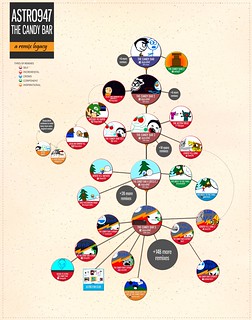The Remixing Dilemma: The Trade-Off Between Generativity and Originality
Thursday, May 9th, 2013This post was written with Benjamin Mako Hill. It is a summary of a paper just published in American Behavioral Scientist. You can also read the full paper: The remixing dilemma: The trade-off between generativity and originality. It is part of a series of papers I have written with Mako Hill using data from Scratch. You can find the others on my website.
Remixing — the reworking and recombination of existing creative artifacts — represents a widespread, important, and controversial form of social creativity online. Proponents of remix culture often speak of remixing in terms of rich ecosystems where creative works are novel and highly generative, however, examples like this can be difficult to find. Although there is a steady stream of media being shared freely on the web, only a tiny fraction of these projects are remixed even once. On top of this, many remixes are not very different from the works they are built upon. Why is some content more attractive to remixers? Why are some projects remixed in deeper and more transformative ways?
We try to shed light on both of these questions using data from Scratch — a large online remixing community. Although we find support for several popular theories, we also present evidence in support of a persistent trade-off that has broad practical and theoretical implications. In what we call the remixing dilemma, we suggest that characteristics of projects that are associated with higher rates of remixing are also associated with simpler and less transformative types of derivatives.
Our study is focused on two interrelated research questions. First, we ask why some projects shared in remixing communities are more or less generative than others. “Generativity” — a term we borrow from Jonathan Zittrain — describes creative works that are likely to inspire follow-on work. Several scholars have offered suggestions for why some creative works might be more generative than others. We focus on three central theories:
- Projects that are moderately complicated are more generative. The free and open source software motto “release early and release often” suggests that simple projects will offer more obvious opportunities for contribution than more polished projects. That said, projects that are extremely simple (e.g., completely blank slates) may also uninspiring to would-be contributors.
- Projects by prominent creators are more generative. The reasoning for this claim comes from the suggestion that remixing can act as a form of cultural conversation and that the work of popular creators can act like a common medium or language. People want to remix famous pop stars because people will be more likely to appreciate the remix if they recognize the remixed track.
- Projects that are remixes themselves are more generative. The reasoning for this final claim comes from the idea that remixing thrives through the accumulation of contributions from groups of people building on each other’s work. Read the rest of this entry »
